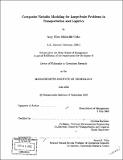Composite-variable modeling for large-scale problems in transportation and logistics
Author(s)
Cohn, Amy Ellen Mainville, 1969-
DownloadFull printable version (7.804Mb)
Other Contributors
Sloan School of Management.
Advisor
Cynthia Barnhart.
Terms of use
Metadata
Show full item recordAbstract
Numerous important real-world problems are found in the areas of transportation and logistics. Many of these problems pose tremendous challenges due to characteristics such as complex networks, tightly constrained resources, and very large numbers of heavily inter-connected decisions. As a result, mathematical models can be critical in solving these problems. These models, however, can be computationally challenging or even intractable. In this thesis we discuss how greater tractability can sometimes be achieved with composite-variable models - models in which individual binary variables encompass multiple decisions. In Part I, we discuss common challenges found in solving large-scale transportation and logistics problems. We introduce the idea of composite variables and discuss the potential benefits of composite-variable models. We also note some of the drawbacks of these models and discuss approaches to addressing these drawbacks. In Parts II and III, we demonstrate these ideas using two real-world examples, one from airline planning and the other from service parts logistics. We build on our experience from these two applications in Part IV, providing some broader insights for composite-variable modeling. We focus in particular on the dominance property seen in the service parts logistics example and on the fact that we can relax the integrality of the composite variables in the airline planning example. In both cases, we introduce broader classes of problems in which these properties can also be found. We offer conclusions in Part V. (cont.) The contributions of the thesis are three-fold. First, we provide a new model and solution approach for an important real-world problem from the airline industry. Second, we provide a framework for addressing challenging problems in service parts logistics. Third, we provide insights into how to construct composite-variable models for greater tractability. These insights can be useful not only in solving large-scale problems, but also in integrating multiple stages within a planning environment, developing better heuristics for solving large problems in real time, and providing users with greater control in trading off solution time and quality.
Description
Thesis (Ph.D.)--Massachusetts Institute of Technology, Sloan School of Management, 2002. Includes bibliographical references (p. 137-142).
Date issued
2002Department
Sloan School of ManagementPublisher
Massachusetts Institute of Technology
Keywords
Sloan School of Management.